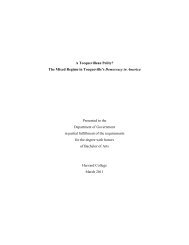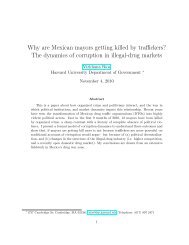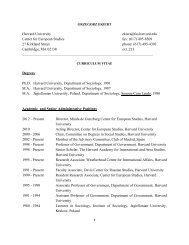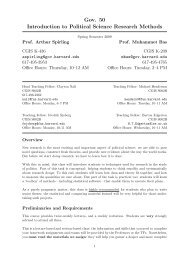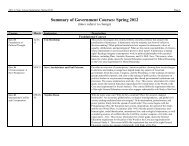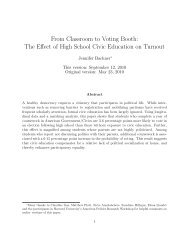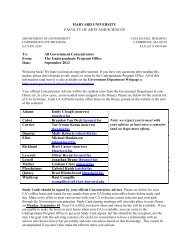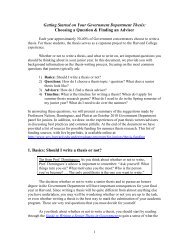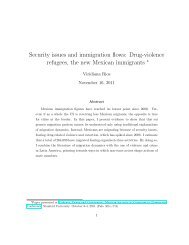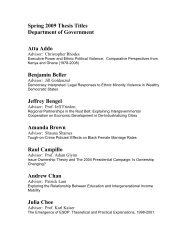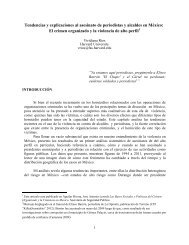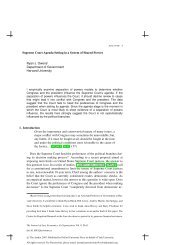1 Harvard University Political Theory Colloquium For 11 March 2010 ...
1 Harvard University Political Theory Colloquium For 11 March 2010 ...
1 Harvard University Political Theory Colloquium For 11 March 2010 ...
Create successful ePaper yourself
Turn your PDF publications into a flip-book with our unique Google optimized e-Paper software.
25 <br />
that reason’s rule is inherently different in kind from what I would call the impostor-rule<br />
of the other parts of the soul. Consider for example the identification of injustice as a<br />
kind of civil war at 444b. One of the parts rebels:<br />
[it] rises up (epanastasin) against the whole soul, in order to rule it<br />
inappropriately (archei….ou prosêkon), but this rebellious class is by nature such<br />
as is suited itself (phusei…prepein) to be a slave (douleuein), while the other part<br />
is not a slave but belongs to the ruling kind’ (444b2-5), reading with the<br />
manuscripts as printed in Slings; trans. Grube/Reeve in Cooper modified).<br />
The idea of the naturalness of the rule of reason is reiterated at 444d, following an<br />
analogy with health and disease: ‘isn’t to produce justice to establish the parts of the soul<br />
in a natural relation of control (kata phusin kathistanai kratein), one by another, while to<br />
produce disease is to establish a relation of ruling and being ruled contrary to nature<br />
(para phusin archein te kai archesthai), one by another?’ (444d7-10, trans. Grube/Reeve<br />
in Cooper modified). So it is only rule by reason which is according to nature. Its rule –<br />
its executive authority – is different in kind. It is not merely one rival among others, but<br />
the only one which is a natural ruler (recall the language of knowledge as ‘fit to lead’ and<br />
‘fit to rule’ on which Socrates and Protagoras agreed). The others are mere impostors.<br />
VI. Conclusion<br />
In closing, we may consider a rival reading of the refutation of the many in the<br />
Protagoras advanced by Raphael Woolf. This reading concludes that after Socrates has<br />
identified the special ‘indicative word-deed inconsistency’ of the many in that dialogue,<br />
there is nothing which follows for the many to do. Woolf contends:<br />
Socrates uses the many’s stated principle of action to show that they cannot be<br />
acting akratically. There is nothing for the many to “do” as a result of this<br />
discovery. What has been shown overtly is not the falsity of a belief that might<br />
need eliminating but the non-existence of an action whose elimination is thereby<br />
redundant. Nothing further is required on the basis of that conclusion - the many



